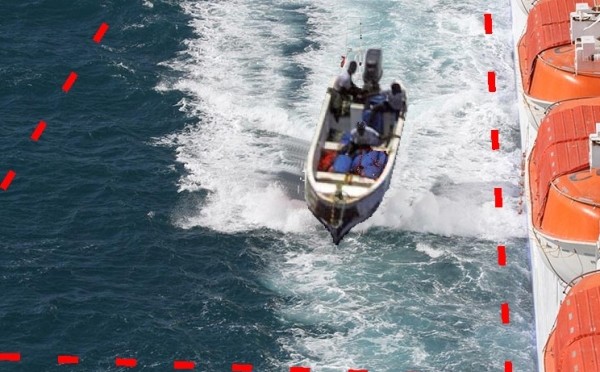First released by Naval-Technology, September 29th, 2014
Matrix Remote Sentinel Systems’ new product line, Possum, promises to augment lookout and threat response tasks with tactical defence capabilities by introducing a ship-mounted, local and remote-controlled, non-lethal Capsaicin fog release and propeller fouling system to deter unauthorised boarding and stop approaching small craft.
According to Michael J. Scott, founder and inventor of Matrix and the company’s new Possum anti-boarding system series, “all past efforts at combating piracy have been chasing a global problem, never to get ahead of it. A radical rethink of what part of the problem to solve opens for the first time the possibility of getting ahead of the problem.”
The Possum line, which is scheduled for production in 2015, grows out of the company’s namesake remote data transmission technology for the maritime domain, Matrix. The Matrix system promises a cure to human error in threat detection and augments vessel monitoring and control, according to the manufacturer.
Remote eyes and ears on board
Matrix offers the ability to remotely and covertly see, hear, communicate with, and take remote control of a client vessel, 24/7/365, world-wide, in port, at anchor and on the open seas.
The system’s primary purpose is to communicate data and video from ship-to-shore-to-ship. It is capable of monitoring perimeter access, bridge functions, engines, propellers, refrigeration systems and cargo systems, among others.
Matrix is managed through a proprietary base-station with screen interface in the bridge. It links directly to Inmarsat fleet broadband satellite for remote data acquisition and provision allowing real-time transmission worldwide.
The system also integrates into the vessel’s radar, PA and video system. It can communicate with wireless camera and sensor technology up to 5km away. Data is transmitted back to land to display on a standard web browser at the ship owner’s office.
Matrix has also planned its own land-based monitoring centre to which ship-owners can outsource vessel function and data monitoring, allowing land-based staff to monitor ship operations 24/7. Matrix’s engineers can work with the ship-owner or operator to design a customised control and recovery system linking the vessel to the land-based monitoring centre, allowing expert staff to remotely take control of the vessel, engines and steering, in the event of a hijacking or other crisis.
Possum: Filling the void in threat response
Although the Matrix system, according to its developers, proves vessels can achieve close to 100%, 24/7 detection and monitoring, a need still remains to stop attackers should they attempt a hostile boarding. After discussion with potential clients and investors seeking something more to provide tactical defence, Matrix developed its new Possum line. The product is aimed at the merchant navy fleet, one of the primary targets of pirates.
Possum is a non-lethal anti-boarding system designed to close the tactical response gap in Matrix, completing the overall concept of total surveillance and deterrence, while integrating into the main Matrix system for global control. It aims to provide a simple and effective solution for stopping attackers and attack craft without lethal force, all at less than 15% the cost of armed guards, according to the manufacturer.
However, the Capsaicin cloud will be visible and thus avoidable for non-target parties navigating outside the immediate area. Capsaicin is heavier than air and will settle and disperse in the sea after deployment.
Protocol for use will recommend having all crew inside a secure area prior to discharge. Post-use, any residue can be hosed away from the ships exterior to prevent accidental contact with crew or passengers.

